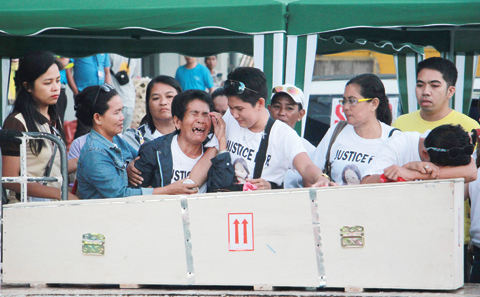Kuwait manpower authority keen to safeguard workers' rights
ILOILO, Philippines: More than a hundred relatives and supporters of a Filipina maid whose body was found stuffed in a freezer in Kuwait brandished banners demanding justice as her coffin was returned home yesterday. The family of Joanna Demafelis openly wept as the white casket was unloaded at an airport cargo terminal in the central city of Iloilo.
"Justice for Joanna D Demafelis," was emblazoned on banners and on T-shirts worn by the crowd which included a congressman and local officials expressing their anger over the death of the Filipina whose body was found in a freezer in Kuwait earlier this month after her employers, a Lebanese man and his Syrian wife, disappeared in 2016. The incident worsened a diplomatic flap between the Philippines and Kuwait with President Rodrigo Duterte alleging that employers routinely rape their Filipina workers, force them to work 21 hours a day and feed them scraps.
He has also banned the deployment of new workers to Kuwait and ordered airlines to fly home any of the 252,000 Filipinos working there who wish to return. About 10 million Filipinos work abroad and the money they remit back is a lifeline of the Philippine economy. Their treatment abroad is often a political issue at home. Kuwait's foreign minister previously condemned Manila's "escalation", of the issue but Philippine Foreign Secretary Alan Peter Cayetano said Friday the Kuwaiti ambassador had assured him his government was "outraged" over the killing and determined to find those responsible.
Cayetano said while the death was tragic, it would be a "rallying point" for governments to work harder to protect Filipinos overseas, while conceding that Philippine-Kuwaiti relations were going through a "very rocky period". He said only about three to five percent of Filipino laborers in Kuwait were having problems but acknowledged the government needed to do more. His department said Monday authorities were repatriating 10,000 Filipinos who had overstayed their visas in Kuwait, with more than 700 flown home already under an amnesty program announced recently by the Kuwaiti government.
A distraught Eva Demafelis could only say "I am sad," when asked by reporters about the death of her daughter. "She does not deserve the manner in which she died. She was beaten up," said an aunt, Rosela Demafelis Taunan, referring to local news reports about the 29-year-old maid's death. "She decided to go abroad because she wanted to help her parents repair the house that was damaged by Super Typhoon Yolanda (Haiyan)," in 2013, the aunt recalled. The slain maid also wanted to finance the college education of her youngest sister, Joyce, the aunt said.
Residents lined the highway as the funeral convoy escorted by police cars and motorcycles made its way to Demafelis' hometown, about a two hour's drive from the city. Labor Secretary Silvestre Bello said late Friday that "working groups" from both countries were discussing forging a memorandum for protecting the rights of Filipinos in Kuwait, many of whom are working as maids. Domestic workers in that country are not covered by ordinary labor legislation, and accounts of Filipinas being subjected to abuse and exploitation in the Middle East have long circulated.
On Friday, the victim's wailing sister threw herself at her sibling's coffin after it was unloaded at Manila airport, while her stunned brother Joejet Demafelis tried to comfort her. "This is a huge loss for us. Her dream, she told my mother, is that she was leaving only because she wanted to help our parents and our youngest sibling," the brother told reporters at the cargo terminal. "My parents can't accept this. Every so often, they start weeping," he added. "I hope they can find those who killed my sister".
Meanwhile, Kuwait's Public Authority of Manpower's spokesman said yesterday PAM is properly playing its due role in protecting workers of various nationalities. PAM is using legal means and specific measures, according to its competence and powers, in order to safeguard the rights of the private sector's workers, Aseel Al-Mezeid said in a press statement. Mezeid, who doubles as head of the PAM's public relations and media department, dismissed as "incredible" recent reports about workers' rights, along with statements by some countries' officials on the conditions of their citizens in Kuwait.
The PAM is eager to protect the rights of workers, but it takes into account the necessity of avoiding possible negative effects on projects and governmental contracts, she added. In this context, several meetings were held between the PAM and representatives of the embassies of the Philippines and India in order to resolve problems regarding some companies' failure to pay the salaries of their workers, PAM's spokesman pointed out. - Agencies











